Does My Jiu Jitsu Gym Need Sexual Abuse Insurance?
Jiu Jitsu gym owners may need sexual abuse and molestation (SAM) insurance coverage to protect their gyms against financial losses resulting from lawsuits and claims related to sexual abuse, physical abuse, or other forms of misconduct that occur within their business. This type of insurance provides coverage for the costs of legal defense, settlements, and judgments in the event of a lawsuit against coaches, owners, or employees at your gym.
Jiu Jitsu gyms often involve close physical contact and a power dynamic between instructors and students, which can create an environment that is susceptible to abuse. Even with thorough background checks, policies, and procedures in place, abuse can still occur, and gym owners must be prepared to respond to such incidents. Having abuse (SAM) insurance in place can help mitigate the financial risk and protect the gym's assets in the event of a lawsuit.
Examples of abuse or misconduct that could occur in a Jiu Jitsu gym include:
Physical abuse such as hitting, slapping, or choking.
Sexual abuse or harassment, including unwanted touching or sexual advances.
Verbal abuse, including yelling, screaming or shouting insults.
Emotional abuse, including bullying or intimidating behavior.
Discrimination based on race, gender, sexual orientation, or religion.
Unprofessional conduct, such as using drugs or alcohol while training.
Negligence, such as failing to properly supervise students or provide a safe training environment.
It's important to note that any type of abuse or misconduct is unacceptable and should be reported immediately to the appropriate authorities. In the meantime, a Jiu Jitsu gym owner can take several steps to mitigate the risk of abuse in their gym, including:
Develop and implement clear policies and procedures regarding abuse and misconduct, and make sure that all staff, students, and volunteers are aware of these policies.
Conduct thorough background checks on all instructors and employees, and consider using additional screening tools, such as fingerprinting and sex offender registry checks.
Provide training for instructors and staff on how to recognize and report abuse and misconduct.
Encourage open communication with students and parents, and provide clear guidelines for reporting abuse and misconduct.
Ensure that there is adequate supervision of students and staff during training sessions and events, and limit one-on-one training sessions as much as possible.
Regularly review and update policies and procedures, and be proactive in identifying and addressing potential risk factors.
Have abuse insurance coverage in place to provide financial protection in the event of a lawsuit or claim related to abuse or misconduct.
By taking these steps, a Jiu Jitsu gym owner can help create a safe and positive environment for students and staff, and reduce the risk of abuse and misconduct.
Does it really happen?
High-profile cases involving allegations of abuse in Jiu Jitsu have been widely reported in the media and can be easily found through online searches and news articles. I would advise conducting a search using keywords such as "Jiu Jitsu abuse court cases" or "Jiu Jitsu misconduct lawsuits" to find more information on these cases.
If a Jiu Jitsu gym owner is accused of misconduct and does not have insurance to cover the cost of legal defense, they may face significant financial consequences. They will have to bear the cost of legal representation and any damages that may be awarded in a court of law. In some cases, they may also have to pay out of pocket for settlements, court fees, and other related expenses.
The lack of insurance coverage can also have a negative impact on the reputation of the gym, making it more difficult to attract new students or retain existing ones. In severe cases, it can lead to the closure of the gym and financial ruin for the owner.
It's important for gym owners to have appropriate liability insurance in place, not only to protect against the cost of legal defense, but also to ensure that they are adequately covered in the event of any claims of abuse or misconduct.
Getting the coverage:
Not all liability insurance policies cover abuse. While some insurance policies may provide coverage for abuse or misconduct, it is not a standard inclusion in all policies. The coverage for abuse and misconduct may vary depending on the specific policy, the type of insurance, and the insurance company.
Typically this kind of insurance (SAM) is not included in standard insurance packages but can be added to a “business owner package” of gym insurance for only a couple hundred dollars per year. When applying for the sexual abuse and molestation (SAM) insurance coverage for your gym the insurance company you are applying with might ask you the following questions on your enrollment, and they expect you to answer "Yes" if they are going to provide you with this type of protection:
Does your staff (paid and volunteer) employment application include questions about whether the individual has ever been convicted of any crime, including sex-related or child abuse related offenses?
Do you routinely conduct background checks on all employees and volunteers working with youth?
Do you have written procedures in place to prevent situations where participants are alone with an individual staff member?
If you are not already practicing the above employment diligence at your gym then we suggest that you use the information in this article or request assistance from your attorney to create best practices for your gym that incorporate the steps necessary to mitigate the risk and insure that you are protected legally.
All in all, it is important to carefully review the terms and conditions of any insurance policy to determine what is covered, including any exclusions or limitations that you might find in a commercial insurance policy for your jiu jitsu gym because SAM insurance is not always included in every plan. It is also a good idea to consult with a licensed insurance professional for guidance and clarification on what types of incidents may be covered as you shop out your commercial insurance program.



